As the caliphate in Syria crumbles, men who fought for ‘true jihad’ in Marawi tell of how the suffering of civilians made them flee
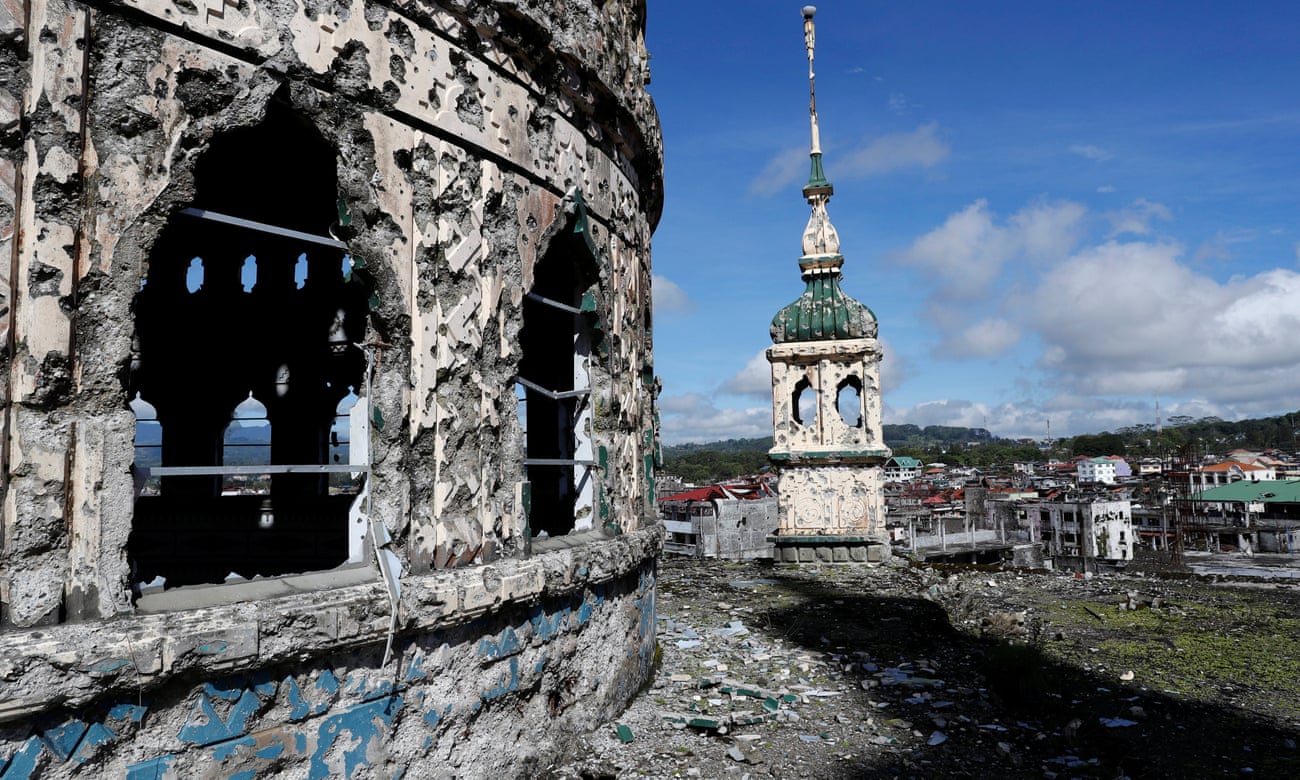
The bullet-riddled domes of Marawi’s grand mosque serve as reminders of the brutal siege of 2017 by Isis affiliate the Maute Group in the southern Philippines. Photograph: Erik de Castro/Reuters
As Isis’s last stronghold in Syria burns, half a world away in the Philippines are men who know how it feels to watch a caliphate crumble.
If Alex could turn back time, he would. He wouldn’t have languished in Marawi City with his 13-year-old son in May 2017 and they wouldn’t have taken the guns the Isis-linked Maute Group handed out on the day that marked the start of a five-month conflict that destroyed the city.
“They said ‘they’re the ones fighting for the true jihad. We’re going to fight to the death to defend our religion and we will reap our rewards in the afterlife,” 38-year-old Alex* tells the Guardian, in one of the first sit-down interviews with a former Isis fighter in the Philippines.
His son died in the ensuing siege. He also lost relatives and friends.
Alex’s testimony comes as Isis fighters in the Syrian town of Baghuz are trapped by advancing Kurdish-led Syrian Democratic Forces (SDF), the Syrian regime and Russia. The last days of Isis in the Middle East have finally come.
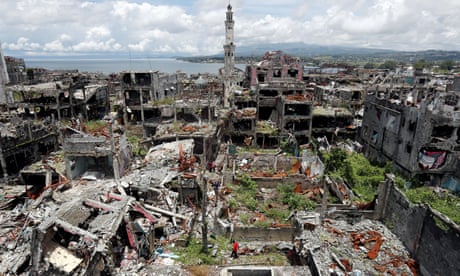
Marawi one year after the battle: a ghost town still haunted by threat of Isis
But in the Philippines the memory of war is still fresh.
“I was worried because I don’t think my son knew how to hold a firearm. But he said he wanted to fight and I couldn’t do anything to stop him,” says Alex. “I only wanted to fight for the true Islam. They fooled us. What we did was really wrong.”
Close to two years after the siege began, Alex says the memories are painful and the violence feels “like a bad dream”.
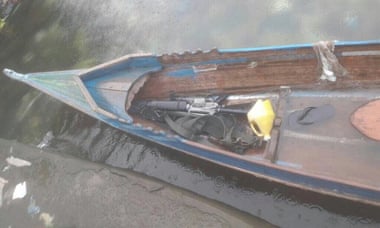
An example of the vessels Maute Group fighters would use to enter and exit the fight in Marawi. Photograph: Philippines military/Western Mindanao command
In 2017, the Maute Group laid siege to the city under the banner of Isis, leading to the deaths of more than 1,000 people. More than a year later, the military is still fighting remnant fighters determined to recruit.
The battle area remains a ghost town as government rehabilitation work continues to suffer delays, meaning about 50,000 residents – or a quarter of the city’s population – are still unable to return to their homes.
Alex says he left the fighting in Marawi after about two months, stricken by guilt when he saw how civilians had died and suffered. He escaped Marawi by threatening a boatman who was delivering ammunition to the battle. His son refused to leave with him.
Until his surrender last year, Alex had been on the run, both from soldiers who knew his name, and from surviving Maute Group fighters who regarded him as traitor. He later learned about his son’s death.
‘I want a peaceful life.
“I’m tired of running. I just want a fresh start and a peaceful life,” says Alex. It is the prayer of about 135 former fighters who have surrendered, hopeful of government promises that they can begin a new life if they give up their guns.
The Philippines government is seeking to reintegrate the former fighters back into the community, one of the measures in the campaign to prevent the possible resurgence of Isis in the country.
“The spirit of reconciliation is the main concept behind this endeavour,” says Colonel Romeo Brawner, the military commander on the ground. “While the government is addressing the needs of the IDPs [internally displaced persons], it is also seeking for a solution to the problem of violent extremism and terrorism.”
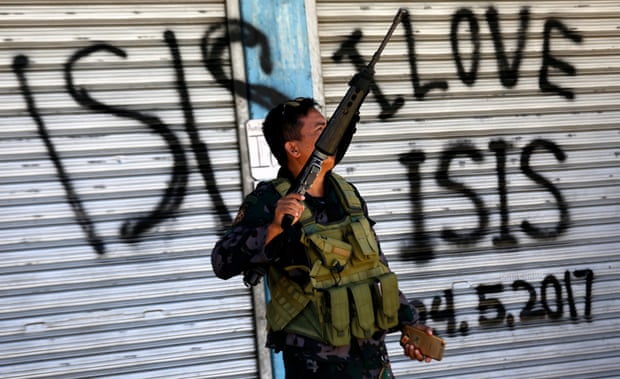
A Filipino soldier patrols an area of Marawi city reclaimed from the Maute Group in 2017. Photograph: Francis R. Malasig/EPA
Alex wouldn’t call himself a die-hard Isis follower. He was recruited to join the Maute Group in April 2016 by a local religious leader in his home town of Piagapo, which shares a border with Marawi. He twice rejected calls to fight for Isis – first in Butig in 2016 and then in Piagapo just a month before the siege of Marawi.
But the death of Alex’s religious leader in the Piagapo clashes drove him and many of his friends to avenge his death. His 29-year-old cousin Asis* was part of that group.
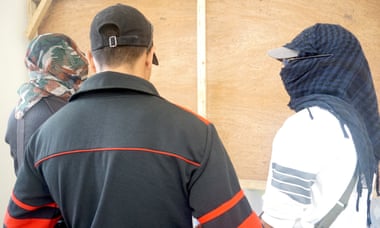
Former Maute Group fighters in the Philippines, Asis [middle], with ‘Alex’ on right. Photograph: Carmela Fonbuena/The Guardian
“I got angry. I really wanted to avenge his death,” Asis told the Guardian. He volunteered to fight and, within a week of the battles, sailed to Marawi with nine others on a boat delivering ammunition. They were told they would receive their firearms in Marawi, and that their families would receive P25,000 (about £370) each.
Alex and Asis fought fiercely at first, both armed by the training they received from the Moro Islamic Liberation Front (MILF), the main rebel group that has since signed a peace agreement with the government. Their fighting experience as former MILF fighters was perhaps why they were targeted by Isis recruiters, they say.
The MILF will now lead a new autonomous Muslim region that promises to fight extremism in the region.
Like, Alex, Asis also left the fighting in Marawi after about two months, along with 16 other fighters who disagreed with the group’s decision to keep civilian hostages. After a standoff with other fighters, they boarded two boats and risked sailing away. “If they didn’t let us go, we would have fought each other there,” Asis says.
Life on the run was difficult. Alex and Asis sought refuge in the mountainous towns around Marawi when even their relatives shunned them. Yet they felt they had “no choice” but to surrender when their families grew scared as the military began knocking on doors to look for them, says Asis.
They know their former colleagues are also hunting them. “They call us traitors. They will kill me if they saw me. But I will kill them first,” says Asis.
But outreach from the government – in the form of livelihoods and financial help – has improved matters.
“We’re better. We can stay with our families now,” said Alex. “I now have friends in the military. Who would have thought that I could make friends with the soldiers I used to fight?” says Asis.
* Not their real names

No comments:
Post a Comment
Note: Only a member of this blog may post a comment.